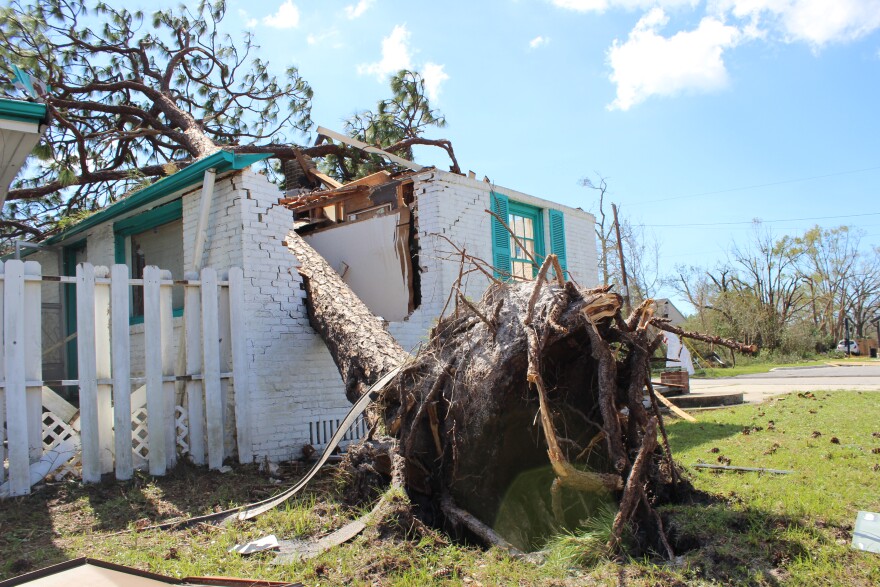On the six month anniverary of Hurricane Michael, legislation to pump at least $315 million into the hurricane-battered Panhandle and to create a task force on state and local disaster responses cleared its first Senate hurdle on Tuesday.
The Senate Infrastructure and Security Committee unanimously backed the wide-ranging measure. Under the bill, the Florida Department of Economic Opportunity would get $300 million for a program that would help counties, cities and school districts cover repair costs from Hurricane Michael. Another $15 million is sought for an agricultural loan program under the Department of Agriculture and Consumer Services.
“Hurricane Michael was one of the most devastating storms that Florida has ever seen; and we will spend several decades trying to restore what Michael destroyed in three hours,” said Sen. Bill Montford (D-Quincy), the bill’s sponsor.
“Visitors to the beach have been hurt, [agriculture] has been hurt,” Montford said. “We’ve lost a severe number of people who have moved out. We have a housing shortage. It’s all coming together to make the disaster even worse.”
Michael — a Category-4 storm — made landfall October 10 at Mexico Beach, causing an estimated $1.5 billion in damages to growers, mostly in the timber industry. The state has already spent about $1.6 billion in response, most of which officials anticipate will be reimbursed by the federal government.
“It will create a long program for local governments and school boards to apply for repair or restore damaged facilities,” said Montford. “The funds will be used to pay contractors and suppliers and must be repaid from insurance claims and FEMA reimbursements, or from other sources. It expands the use of agriculture loan programs, including those in the forestry industry.”

Agriculture Commissioner Nikki Fried and a bipartisan group of state lawmakers recently visited communities in rural northwest Florida that are still struggling in the aftermath of last October’s storm.
“The point of this trip was to go out to the Panhandle so everybody can see first-hand the devastation of what’s happening in our Panhandle,” Fried said. “And it’s time for us to stand up and make sure they’re not forgotten. And make sure we get resources out there for debris removal, reforestation, and then obviously to get ready for – as we know – into the dry season.”
The trip was also aimed at getting the message back to legislative leaders, to meet her agency’s request for $39 million dollars to help growers and prepare for the anticipated spring and summer wildfires. She also wants Uncle Sam to kick in.
“We need to make sure we are taking care of our friend up here in the Panhandle,” said Fried. “And to do everything that we can to push the federal government and get a disaster package from the state. We need to be taking care of our citizens up here. Seeing this firsthand, there’s just no words.”
The lawmakers toured the property of Calhoun County timber farmer Jimmy Suggs, whose family has been growing trees and raising cattle since the 1930s. But decades-old slash pines reaching maturity at Suggs’ farm were wiped out by Michael, and Suggs is now facing the prospect of having to give up the land.
“You’re probably looking at maybe $2,000 per acre minimum to clear this, and we don’t have any timber to sell to pay for that, said Suggs. “My pockets just aren’t that deep, and neither are many other people in this area. They just can’t afford it. I don’t know what we’ll do.”
The state House is proposing to spend almost $21 million toward Fried’s funding request, but she says that, and the budget from the state Senate, fall short. She concedes that money would not be reimbursed by the feds but even if it were, it would be too late.
“That is restoring irrigation, rebuilding aquaculture, cost-sharing of landowners to clear the lands and fire front,” Fried said. “[We] have to clean up 72 million tons of trees that are now on the ground.”
The $39 million proposed by the Ag Commissioner would also pay for wildfire suppression equipment, a new helicopter, forestry road and bridge repairs, and forestry facility repairs and replacements. Fried suggests that Florida follow Georgia in providing $50 million in low-cost loans to farmers impacted by Michael.
“We can do that here in our state, and we can do it now; so we are asking our Florida legislators to stand up, help our citizens in the Panhandle,” said Fried. “And we are begging Congress to stop the partisan bickering and get a disaster relief package passed today.”
“We are suffering.”
Fried spent three days in Washington, D.C. to lobby on behalf of farmers and to ensure timber is listed as a crop in any relief package. The group is also urging the Legislature to match a relief package lawmakers crafted after Hurricane Irma in 2017, which impacted a far-broader part of the state.

